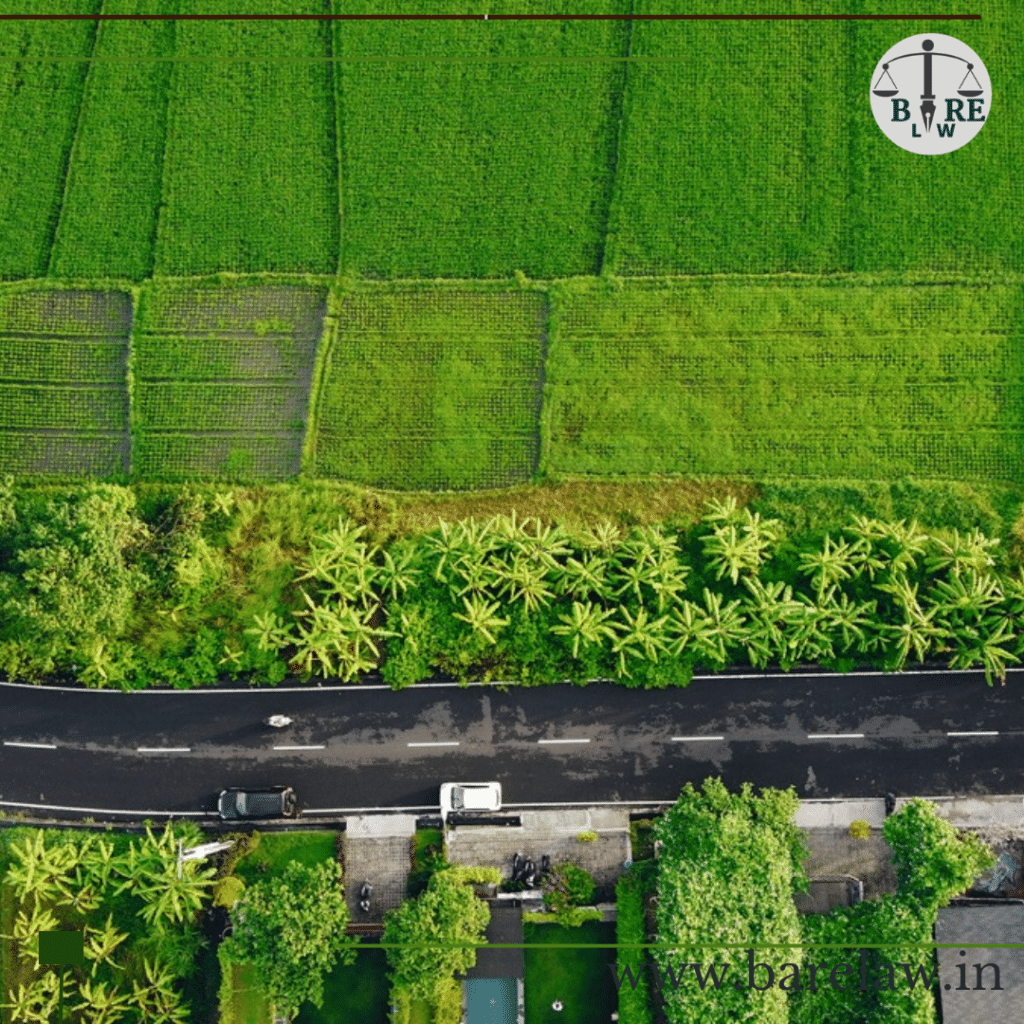
Introduction:
The Indian Constitution empowers the state and Union governments to enact laws on various subject matters as categorized under the seventh schedule of the constitution.
Any enactment relating to land and certain aspects surrounding it except the taxes on various lands shall come under the ambit of the state list (List 2 – entry 18), and it is important to note that such laws on lands shall be enacted only by the states and not the union government.
The reason for such power is to vest certain law-making powers in the hands of the State through their legislative process.
One of the examples of such enactment is the present law which is in debate across the State of Karnataka, which is the Karnataka Land reforms act of 1961 (social welfare legislation).
The following topics below shall discuss the importance and recent changes that provoked the debate on the said social welfare legislation.
Karnataka Land Reforms Act and its importance:
Through the powers conferred under Article 246 (legislative powers of both State and union) of the Indian constitution, the State of Karnataka enacted a land reform legislation called the Karnataka Land reforms act of 1961.
The objects and the intention behind the enactment of such law were to preserve and protect the interests of tenants and also to protect the interests of the farmers within the State.
It ensures the collective distribution of lands among the tenants and farmers, thereby ensuring there is no intervention of corporate and other entities that are remote to the concept of social justice.
Having a such background on the law, it is important to know how this intention or the main objectives have been titled with the introduction of the recent ordinance/bill in the year 2020.
The ordinance has been promulgated through the powers conferred under Article 213 of the Indian Constitution.
The following shall analyze the said amendment, its objective, radical changes that were introduced and a petition which has challenged the constitutionality of the said amendment.
This analysis shall conclude with the effect that it has on the State and the personal views on its implementation.
What was the reason and purpose behind the 2020 amendment?
- The statements and the objects of the amendment, as mentioned by the government in the bill, are as follows.
- It was observed that there were many cases that have been filed against persons who are in violation of Sections 79A and 79B of the Karnataka Land reforms act of 1961.
- And there were also requests made to remove the restrictions that are placed on the acquisition and holding of agricultural land.
- Taking this into consideration, along with the Karnataka HC’s directive in the Interim order dated 28/5/2019, the government has moved the bill in the legislative assembly of the State.
- The objects as intended by the legislature are as follows:
- Firstly, to remove the restrictions on the agricultural land and the purchaser of the agricultural land shall use the said land for agricultural purposes only.
- A-class irrigated lands shall be sold only for agricultural purposes
- Any agricultural land shall be mortgaged only in the financial institution as specified under section 81 of the Karnataka Land reforms act, 1961
- The restrictions which are present on those lands granted under Karnataka SC/ST (Prohibition of certain lands) act, 1978 shall not be relaxed through this amendment under the act.
Karnataka HC’s directive 2019 to the State:
In W.P. No. 16199 of 2019, an interim judgment was passed by the Karnataka HC where the court gave few guidelines/directives to the state government in order to resolve the disputes that arose under sections 79A & 79B of the Karnataka Land reforms act, 1961.
It noted that many orders had been passed on the said sections, but there was no action of confiscation of land occurred from the side of state authorities.
The Principal Secretary of the State was directed to initiate the proceedings under the act on those matters which were passed in favour of the State.
Considering all these in mind, the state government – hereby proposes the amendment to the Karnataka Land reforms act, 1961
What are the Changes brought by the Amendment bill, 2020:
A few of the changes/omissions that were made by the state government in the land reforms act of 1961 are as follows:
Section 63 of the act deals with the limit on total holdings of units of land by a person or by the family or by a family which has more than five members. The number of units has been doubled, which means that the person or family holding ten units earlier shall have the power to hold 20 units of agricultural land, and on the other hand, the person or family having 20 units of land shall have a limit of not exceeding 40 units.
As per section 79A of the act, there were certain restrictions that were placed on any person or family to acquire the land. It states that persons or families with an annual income of more than 25 lakhs shall not be allowed to hold or acquire agricultural land. These restrictions were absolutely omitted through the 2020 amendment
On the other hand, section 79B of the act deals with the restrictions on certain persons and entities holding or acquiring agricultural land. They include – corporate entities such as companies, trusts, educational institutions, associations or cooperative societies. This was also omitted through the 2020 amendment to the Karnataka Land reforms act, 1961.
The penalty for failure to furnish the declaration under section 79C of the act was also removed.
Writ petition before Karnataka HC – challenging the said ordinance/bill 2020:
A Writ Petition was filed against the amendment moved by the state government to the Land reforms act of 1961. The petitioner, a Journalist and a social activist have contended that the said omission of sections 79A & 79B has affected the farmer community in the State of Karnataka and is in violation of the Constitutional principles enshrined under the Preamble, Article 14, 19 and 21.
- Under the preamble, the term socialist has been inserted into the supreme law considering the nation to be in line with welfare and social justice across sectors in the country. This socialist idea – both economic and social justice – has been violated by the said amendment of 2020
- Secondly, article 14 of the constitution ensures that there is no class legislation being enacted. Rather a reasonable classification can be made for the purpose of achieving the goal intended. As per the twin test laid by the Supreme Court in a landmark judgment, two aspects must be proved when a reasonable classification is made.
They are 1) there should be intelligible differentia – which means that the law should make certain differentiation between the people, and 2) rational nexus – which ensures that such classification made through the law has some nexus or rationale attached to the object of the act. This aspect was violated through the 2020 amendment
- Thirdly, Article 19(1) (g) of the constitution has been violated as the farmers have been restrained from carrying out their business or trade; thereby, their fundamental right to freedom of trade and business has been grossly violated.
Effect of the Amendment on the State:
- It enables various entities such as corporate bodies or educational institutions to hold or buy agricultural land and they can perform any activity on such land. Such usage of the land would also help the commercial activities to be carried out and thereby creates revenue and employment opportunities as well.
- The farmers can now sell their lands even to those persons or entities which are not involved in the non-agricultural activities,
- Debts of the farmers shall also be recovered by the lenders through the selling of those agricultural land through financial institutions, thereby increasing the efficiency,
- On the other hand, there have been cases which were filed against the move by the state government on the Karnataka Land reforms act.
Conclusion/Views:
Any land reform legislation should have its objective to balance both the economic as well as social needs of a community. The previous Karnataka Land reforms act, which came into force in the year 1961, had this objective in mind while framing the law to restrain the holding of agricultural lands from the hands of other entities which are remote to the concept of agricultural importance. This does not mean that lands should only be vested with the farmers, but rather there is a nexus between such classification and restrictions being imposed on the holding and acquiring lands by restricted entities. In spite of greater hope from the side of the state government, there are also criticisms that question the validity of the bill of 2020 against the principles enshrined in the Indian constitution. The applicability of the said amendment needs to be effectuated by balancing the interests of other entities with the interests of farmers.
Also, Read – https://www.barandbench.com/columns/karnataka-land-reforms-amendment-act-2020-analysis





